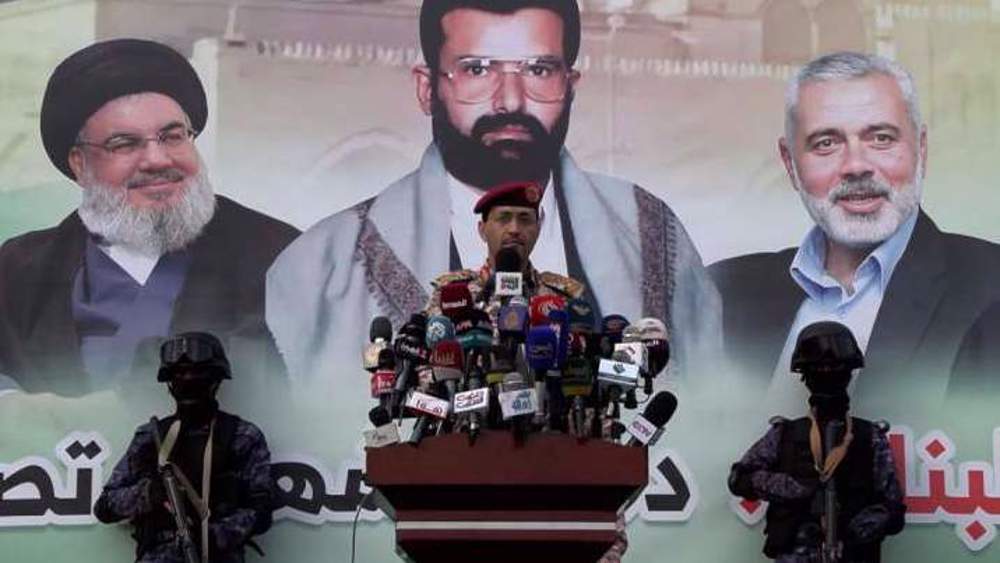Six Yemeni missiles hit gatherings of Saudi-led forces in Jizan
Yemeni army forces, backed by allied fighters from the Houthi Ansarullah movement, have hit gatherings of Saudi soldiers and Saudi-led mercenaries in the kingdom’s southwestern Jizan region with six domestically-manufactured missiles in retaliation for the kingdom’s campaign of military aggression against the impoverished nation.
Yemen’s Arabic-language al-Masirah television network, citing unnamed military officials from the missile unit of the Yemeni army, reported on Thursday that six Zelzal-1 (Quake-1) short-range missiles hit the enemy gatherings off Qais Mountain and the village of al-Laj in Jizan province on Thursday.
It added that the projectiles had successfully struck the designated targets, killing an unspecified number of enemy forces.
The report added that at least three Saudi-led forces had been killed and two others wounded by explosives planted by Yemeni troops in al-Nar Mount area in Jizan.
Meanwhile, al-Masirah said in a separate report that the Yemeni army managed to shoot down a spy drone belonging to Saudi-led forces in the coasts of Yemen’s western province of Hudaydah.
Later on Thursday, the Yemeni army spokesman said that 28 Saudi-led mercenaries were killed and 64 others injured during clashes with Yemeni forces in Damt region in the southern province of Dali'.
Leading a coalition of its allies, including the United Arab Emirates and Sudan, Saudi Arabia invaded Yemen in March 2015 in an attempt to reinstall former president Abd Rabbuh Mansur Hadi, who had resigned amid popular discontent and fled to Riyadh.
The imposed war initially consisted of an airstrike campaign but was later coupled with a naval blockade and the deployment of ground mercenaries to Yemen.
Since the onset of aggression, the Yemeni army, backed by fighters from the country’s popular Houthi Ansarullah movement, has been defending the impoverished nation against the invaders. The coalition is also resolute to crush the movement as another goal in its war on Yemen, which is teetering on the edge of famine.
In a statement on Thursday, the World Food Programme (WFP), the world's largest humanitarian organization addressing hunger and promoting food security, said that its survey conducted in October found that more than 15 million Yemenis were in a “crisis” or “emergency” situation and that the number could hit 20 million without sustained food aid.
The Saudi-led military aggression is estimated to have left 56,000 Yemenis dead.
More than three and a half years into the war, Saudi Arabia has achieved neither of its objectives. Riyadh had declared at the start of the invasion that the war would take no more than a couple of weeks.
The situation has worsened in Yemen in recent months due to a broad economic collapse after a full-scale offensive by UAE forces, backed by armed militia loyal to Hadi, was launched against the Houthi-held port city of Hudaydah in June.
More than 70 percent of Yemen's imports pass through the docks of Hudaydah, which is currently under a tight siege imposed by the invaders.
The so-called liberation operation, however, failed to achieve its objective of overrunning the vital port and defeating Houthi fighters.
Iran beats traditional rival Russia in freestyle and Greco-Roman wrestling friendly
Rape trials trigger protests against French ‘sexist and misogynistic’ culture
US photographer opens Berlin exhibition with anti-Israel speech
VIDEO | Press TV's News Headlines
VIDEO | US 'non-profit killer’ bill targets pro-Palestinian groups
Explainer: How Yemeni military chased away US aircraft carrier from Red Sea?
French march for women of Palestine
Erdogan: Upholding ICC arrest warrants will restore trust in intl. system















 This makes it easy to access the Press TV website
This makes it easy to access the Press TV website